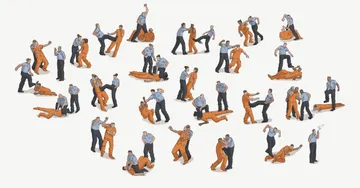This is The Marshall Project - Jackson’s newsletter, a monthly digest of criminal justice news from around Mississippi gathered by our staff of local journalists. Want this delivered to your inbox? Subscribe to future newsletters.
Thousands of Mississippians will remain unable to vote in this year’s presidential election after a federal court’s decision upholding one of the harshest felony disenfranchisement laws in the country.
Last week’s ruling by the 5th U.S. Circuit Court of Appeals on a 13-6 vote reversed a prior ruling by a three-judge panel of the same court, which struck down Mississippi’s law as unconstitutional. Those three judges said Mississippi’s lifetime voting ban is cruel and unusual punishment. Several disenfranchised Mississippi residents sued the state to regain their voting rights.
The plaintiffs who brought the lawsuit are still exploring whether to appeal the case to the U.S. Supreme Court, according to attorney Jonathan Youngwood, with the Simpson Thacher & Bartlett firm.
“Denying broad groups of our citizens, for life, the ability to have a role in determining who governs them diminishes our society and deprives individuals of the full rights of representative government,” said Youngwood in a written statement. “We remain confident in this case, and our clients remain committed to ensuring that their right to vote is restored.”
Most states restore voting rights to people convicted of felonies at some point after they complete their sentence. But in Mississippi, not only will violent crimes like murder and rape permanently disenfranchise someone, but so will several nonviolent convictions, such as writing a bad check, felony shoplifting and possession of counterfeit currency.
This decision by the 5th Circuit, one of the most conservative federal appeals courts in the country, comes as national efforts to expand voting rights for people with felony convictions are meeting roadblocks and rollbacks.
A recent attorney general’s opinion in Nebraska has thrown into doubt a 2005 state law that restored the voting rights of people with felony convictions after a two-year waiting period following release from prison.
This year, Nebraska lawmakers removed that two-year waiting period, allowing for immediate restoration of voting rights following release from prison.
But last week, an opinion from Nebraska Attorney General Mike Hilgers offered the view that the state Legislature cannot restore voting rights, arguing that only the state Board of Pardons may do it.
Alabama also faces confusion about voting eligibility in November. A new law will add about 120 crimes to the list of offenses that block someone from voting, but it doesn’t go into effect until Oct. 1, after early voting begins in Alabama. That raises the possibility that someone could legally cast a ballot in September, but be ineligible to vote by the time that ballot is counted on Nov. 5. A lawsuit has been filed to block the law.
In Mississippi, a previous lawsuit had unsuccessfully challenged the state’s disenfranchisement law as racially discriminatory.
Learn more about felony disenfranchisement from The Marshall Project - Jackson
- Who Can and Can’t Vote in Mississippi: A Guide to the State’s Lifetime Voting Ban
- How Mississippi’s Jim Crow Laws Still Haunt Black Voters Today
- Mississippi Wants to Allow Some Votes From Jails and Prisons. Red Tape May Stop It.
Send us your story tips!
If you’ve experienced or witnessed something in the criminal justice system that you think we should look into further, contact us through this form or jackson@themarshallproject.org. All tips are confidential.
